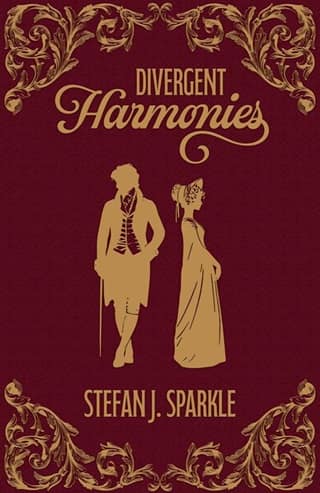Violin Concerto No. 3 in G Major, K. 216 II. Adagio
“Welcome, welcome, Captain. It is lovely to see you,” said Mrs Hargreaves as she greeted Jack at the entrance with an outstretched hand encased in white kid gloves. She was resplendent in a gown of burnished gold silk; its cut flattered her imposing figure. The regal bearing she exuded stemmed not solely from her attire but also from the authoritative yet gracious manner in which she ushered him inside.
The Hargreaves’ stately drawing room had been impeccably prepared for the afternoon tea. Amidst a backdrop of congenial chatter and the delicate clink of fine china, sunlight poured through lofty windows, scattering prismatic rainbows from the crystal chandelier across immaculate walls graced with tasteful artistry. Each nook radiated an aura of refined warmth, subtly inviting all those gathered into a state of relaxed fellowship.
Mrs Hargreaves presided over the tea service with vigilant eyes that missed no detail. Lady Fitzroy, attired in a gown of moss-green muslin which suited her understated elegance, was engaged in subdued conversation with Charlotte. The dress’ short sleeves were complemented by cream-coloured embroidery adorning its hem, and atop her hair sat a delicate comb, embellished with faux flowers and pearls that quivered lightly as she spoke with animation.
Charlotte’s movements caused her lilac cotton dress to flutter. The short-sleeved garment, recently acquired from London and with a much higher waist than was customary, was set off today by a cream sash. A gold locket near her collarbone caught the light, twinkling with each burst of laughter she shared. In place of her usual tidy bun, intricate red curls tumbled loosely around her shoulders.
Helena had accepted the invitation to tea, her mother having sent apologies for an unavoidable engagement elsewhere. Amidst the grandeur of the dining room, Helena was a vision in her blush rose-pink satin dress, its sleeves embracing her slender arms. Her hair was restrained by a simple ribbon as she navigated through conversations with wide eyes that mirrored storm clouds—eyes brimming with innocent curiosity and silently observing each exchange.
Within the refined setting, Gerald Hargreaves initiated a probing discussion with Jack. His robust physique and constant smile complemented his sturdy and reliable presence, reminiscent of the oak furniture that graced the estate.
“Captain,” he began, stirring his tea with methodical precision as though pondering the question at hand, “we must give thanks for the British forces’ pivotal role in the Peninsular War; otherwise, we might all be conversing in French at this very moment. Would you concur?”
Jack was seated beside Anastasia, who exuded an aura of serene elegance. Her tranquil eyes radiated quiet determination, and she shimmered in a delicate dress of pale peach chiffon. The simplicity of her beauty was accentuated by a stunning parure of gold and amber, fashioned with intricate floral motifs.
Initially taken aback, Jack maintained his composure, finding solace in Anastasia’s presence which alleviated the usual tumult that hindered his ability to respond adequately. “I respectfully disagree with the… notion that our involvement was indispensable for… the allied victory,” countered he.
Accepting a plate of bread from his wife, Gerald responded, “One cannot simply dismiss our involvement as inconsequential. It was the British who triumphed in the war by invading Spain after Napoleon’s troops had occupied the country.”
Jack’s haunting memories of lives cut down in their prime became blessedly distant as his awareness shifted from Gerald to the silver-flocked wallpaper. “Indeed, the British forces displayed remarkable… bravery and played a… significant role in key battles such as Salamanca and… Vitoria,” remarked Jack while passing Anastasia a slice of ham. “Nevertheless, it could be argued that their presence… prolonged the war by several years.”
Gerald pulled his head back and squinted at Jack, his usual joviality assuming a sombre turn. “Nevertheless, we must not forget the spirit of self-sacrifice and willingness to defend our homeland and kin.”
Realising that he was being tested, Jack allowed a light irritation to seep into his voice. “While it is important to… acknowledge the need to defend our homeland and kin, we must also acknowledge that… these ideals are often used as justifications for war. In reality, conflicts are driven by… political or economic interests. Those who run off to fight for causes they may not fully understand are simply pawns to be used and discarded in these ridiculous games of supremacy.”
The table fell silent, taken aback by Jack’s extended speech. The sound of his own heartbeat pounding in his ears, he looked to Anastasia. Her tender smile graced her lips. Beneath the blue muslin tablecloth, the clasp of her silk-clad fingers, soft and comforting, implored him to dismantle the lonely bastion he had constructed around his heart and permit her to be his support.
Gerald ladled another spoonful of sugar into his tea before he proceeded, his countenance alight with the fervour of their spirited discourse. “Whilst one should never engage in warfare without due consideration, there are indeed circumstances under which it may be deemed necessary, even before all alternative avenues have been pursued. At times diplomacy fails utterly. We must not dismiss outright the prospect of martial action – doing so would render us exposed and impotent in certain predicaments.”
“An individual who repels an aggressor acts to preserve their own life and well-being,” said Jack. “Should negotiations founder due to one party’s obstinacy or duplicity, then our need lies in cultivating more adept negotiators capable of surmounting divisions.”
Jack became aware that his hold on Anastasia’s hand had grown firm, and he promptly loosened his grasp. Yet before he could withdraw, she clasped it.
“Well, I believe we have indulged sufficiently in this sombre discourse!” said Mrs Hargreaves, halting the conversation. Gerald and Jack exchanged looks and chuckled before they offered her a slight nod by way of apology.
“Pardon me, gentlemen,” Helena commenced, hesitantly. “But my mother often remarks that even the most resplendent rose is not without its thorns. It occurs to me… well, perhaps war bears a resemblance to such a bloom? It possesses both splendour and sorrow.”
“Indeed, that is a most perspicacious observation,” said Lady Fitzroy, ever inclined to foster the tentative insights of youth. “In one respect I concur; a rose with its allure and thorns may well serve as an allegory for numerous facets of existence. Speaking of roses, have you observed the Duc de Guiche in the garden? I am led to believe they are a hybridisation of Apothecary’s Roses.”
Upon the utterance of “Apothecary,” Anastasia stiffened, her breath halting in her throat as the ghostly fragrance of laudanum drifted by.
“I have had the pleasure of cultivating hybrids myself,” observed Jack, feeling the flinch through his hand. “What are your thoughts on the new Empress Josephine variety they have in France? A Descemet, if I am not mistaken?” He sensed Anastasia relax as their discourse shifted from disquieting recollections.
Mrs Hargreaves smiled, exchanging a knowing glance with Lady Fitzroy. “Indeed, I have one such specimen imported into the garden, a gift from Amelia. You must come and admire it once we conclude our tea.”
The prospect of encountering a new variety of rose, especially one as rare as the Empress Josephine, roused an eager anticipation in Jack. “Indeed! It would be my utmost delight.” His mind brimmed with questions regarding the cultivation and care of this unique bloom.
Lady Fitzroy observed Anastasia droop slightly and realised she might be feeling a trifle left out. “And perhaps Miss Hartford might find pleasure in the visit as well?”
Jack blinked, momentarily disconcerted by the suggestion, then realised that he had inadvertently made it about himself. “Of course! It would be my honour for Miss Hartford to join us,” said he with haste, offering Anastasia a brief glance of apology that conveyed both earnestness and a touch of chagrin.
Upon regarding Jack’s sincere countenance, filled with regret and followed by his heartfelt invitation, Anastasia’s fleeting doubts were swiftly dispelled.
Bathed in the gentle glow of the afternoon light, Jack’s visage acquired an almost ethereal allure. His lips were slightly parted as if inviting her closer. His dishevelled hair lent him an irresistibly rakish charm, while his green eyes mirrored once again that look of awe.
A rush of arousal coursed through Anastasia as the display of affection ignited a flame she had long endeavoured to suppress. In that instant, something fundamental altered within her being. The fire coursing through her veins pulsed in harmony with the rhythm of her heart, throbbing with a desire both exhilarating and daunting. Her breathing quickened; every sense sharpened, attuned exclusively to Jack.
Utterly captivated, Jack observed Anastasia’s cheeks flush with a delicate rose hue and the copper tones in her eyes gleam with an intensity that left him breathless. The sight of her emotions so vividly displayed kindled within him a fervent longing that mirrored the passion he discerned in her gaze.
Mrs Hargreaves, Charlotte, and Lady Fitzroy momentarily ceased their conversation to observe the unfolding romance. Helena watched the scene with wide-eyed innocence, her lips curved into a sweet smile. Mr Hargreaves hummed softly under his breath as he added sugar to his tea.
A tide of self-awareness enveloped Jack and Anastasia and they turned back to the group.
Following several minutes of animated discourse and numerous cups of tea, Lady Fitzroy gracefully stood and gestured to the garden. “Shall we?”
The assembly rose in response, save for Mr Hargreaves, who remained happily with his inexhaustible supply of sweetened tea and the day’s newspaper.
The afternoon sun cast warm hues over the garden as they strolled along the gravel path. Lady Fitzroy led the way, drawing attention to the Duc de Guiche rose with its vibrant wine-crimson petals touched with purple, standing out strikingly against the green foliage.
Upon nearing the much-anticipated rose bush, with its verdant leaves and buds on the cusp of unfurling into exquisite blooms tinged with pink, Jack turned to Anastasia, his eyes alight with excitement. His voice was imbued with a touch of childlike wonder as he spoke, his enthusiasm palpable in the air. “Is she not beautiful? It conjures memories akin to those of old books.”
“It does possess a certain charm,” remarked Anastasia, uncertain of his intentions, yet willing to follow where he might lead.
“What I mean to say is that it seems as though a story unfolds before us, one that spans across centuries,” elucidated Jack and took her hand without thinking.
Anastasia’s understanding giggle resonated softly as she squeezed his hand. “The careful nurturing, the time each bud takes to unfurl into a breathtaking bloom, and how every petal reveals yet more of its exquisite beauty… It is akin to the pages of a cherished book coming alive before our very eyes.”
As the sound of her laughter subsided, he contemplated how to prolong their time together. His own rose garden came to mind, along with the joy he anticipated in sharing its splendours with her. However, that was far beyond anything he could hope for; thus, he cast that notion aside in favour of something more appropriate.
His gaze briefly met Lady Fitzroy’s, who was engrossed in a conversation about the hybridisation process with Helena. Taking Helena’s arm, Lady Fitzroy guided her deeper into the garden.
Mrs Hargreaves and Charlotte saw Lady Fitzroy move away, glanced over to see Anastasia breathlessly waiting for Jack to keep talking, and were suddenly quite interested in something that was in the garden shed.
Gathering his courage, Jack continued in a quiet rumble, “Would you grant me the honour of accompanying you home, Miss Hartford?”
Glancing around, Anastasia suddenly realised they were alone and with a surge of joyous anticipation, she responded with the same formality he had given her for this moment.
“I would be absolutely delighted, Captain Clifton.”
 Fullepub
Fullepub 



